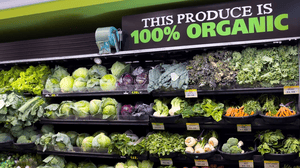Q&A With Randall Onstead
"Though not 100% complete, we are materially through our integration. Suppliers can now think of us as a fully integrated company" — Randall Onstead, president and CEO, Bi-Lo Holdings
Randall Onstead, president and chief executive officer of Bi-Lo Holdings, in an interview with SN’s Jon Springer addresses the integration of Bi-Lo and Winn-Dixie and his strategy for the combined company.
Supermarket News: Now that a year has passed since the combination of Bi-Lo and Winn-Dixie, how “together” are the companies today?

Randall Onstead, president and CEO of Bi-Lo Holdings
Randall Onstead: Though it’s hard to imagine, March 9 marked the one-year anniversary of the merger of our two companies. We’ve come a long way in 12 short months, and our associates have a lot to be proud of.
Though not 100% complete, we are materially through our integration. Suppliers can now think of us as a fully integrated company. It’s been a huge effort, with many associates to thank for their part. From the very beginning, we said we didn’t want the integration work to impact our customers or consume more of our time than our efforts to improve our stores and grow our top-line. That’s been the case.
SN: What support and/or services are common to both banners and what services remained separate? What plans do you have for additional support or service combination?
RO: Although the company will maintain a presence with a regional office and customer call center in Greenville, most of the back-office responsibilities are now in Jacksonville.
SN: Prior to the merger, Winn-Dixie self-distributed, and BI-LO outsourced distribution from C&S. How if at all has that changed? What considerations have you made toward getting both banners on a common distribution platform? Is that in the planning stages?
RO: We have two distribution models in place and we are satisfied with both. We have a contract with C&S to supply our Bi-Lo stores that runs for a couple more years. We are always open to considering opportunities to optimize all aspects of our business, including our supply chain.
SN: What in your opinion has been the biggest benefit of the combination?
RO: The biggest benefit of the combination is that we have great people. Leveraging the combined talent and expertise of our associates is allowing us to run better stores for our customers.
SN: Can you provide examples of how Winn-Dixie may have benefited Bi-Lo or the other way around?
RO: There are dozens of examples of where one banner has benefited from the experience of the other. Many aren’t customer-facing and reside in policy and procedure. For instance, we converted Bi-Lo to Winn-Dixie’s pharmacy system because it was better. Winn-Dixie has adopted much of Bi-Lo’s merchandising strategy and field and store organization structure.
Read more: Bi-Lo/Winn-Dixie Open to More Acquisitions: Omstead
SN: How has a being larger entity helped?
RO: Our increased scale has created a great opportunity for us and our customers, and our people are helping us to unleash it.
SN: What have been the most challenging parts of the combination?
RO: The hardest part of any integration is always the elimination of duplicate jobs.
SN: What can you share about how sales and profits have evolved over the last year? How are same-store sales? How has performance of the combined company aligned with expectations?
RO: One of the advantages of being a private company is that we are not obligated to publicly discuss sales and profit. What I can say is we are pleased with our performance to date. We continue to capture the synergies from our merger and if you talk to our vendor partners many would tell you their year over year business with us is healthy. Performance of the combined company is what we expected but I’m also keenly aware that we compete against some of the best operators in the US.
Onstead: Rebannering Not on Agenda
SN: To what extent have customer-facing strategies of the chains evolved? Can you provide an update on Bi-Lo’s plans to remodel and rebrand its stores and on Winn-Dixie’s efforts at remodels and “neighborhood” marketing? To what extent if at all are the brands becoming “more similar” to one another, and what advantages are there in that?
RO: I want to be very clear that at no time have we considered rebannering our stores. On the contrary, both banners have strong ties to our communities and neighborhoods and are rich in history. For our company, we don’t subscribe to the belief that the only way to improve brand image is with capital expense. I do believe the best way for us to improve our brand is to be a better operator in the first place. Bi-Lo is a much better operator today than it was five years ago, and as a result we have invested heavily in our stores. Winn-Dixie and Bi-Lo will continue to improve if we listen to our associates and act on what they tell us they need in their neighborhoods to sell more groceries. As we become better operators, we will invest capital.
SN: What is next for Winn-Dixie and Bi-Lo? Can you talk about plans for cap-ex/new stores/remodels/new formats in 2013?
RO: We want to grow our combined company, and we see several ways of doing this across both banners.
First, we will continue to grow organically at both banners. We have plenty of capacity to grow within our existing stores, and our store teams are working hard to grow their sales.
The second way is through smart capital investments in our stores. We are fortunate to operate in a part of the country where there are unique differences in many neighborhoods, how people shop and what foods people prefer to eat. Our capital plans should complement these differences. Going forward, we feel we need to build and remodel stores that cater to the neighborhoods we serve. That means we’ll focus on departments and service enhancements that make sense for each neighborhood and customer.
We do have plans to keep remodeling and building new Bi-Lo and Winn-Dixie stores, but we don’t disclose specifics for competitive reasons.
Join SN's LinkedIn Group to network with industry professionals.
SN: What is your expectation for growing sales in 2013, and factors do you see that will affect that? What are your company’s goals for this year?
RO: Again, we are very pleased with our current performance. Factors affecting our performance are numerous.
We believe in working backwards from our customers and from the associates who serve them. We are empowering our people to make decisions in the best interest of our customers. This helps create a culture of trust and accountability.
We are striving to keep our business simple. Doing business with us should be easy. After all, we are in the business of giving people what they want to provide for their families.
We are responding to customer needs with a sense of urgency. Our customers deserve quick responses to their questions and requests. To be big, we have to act small, and that means sometimes cutting through the red tape to give our customers quick resolutions.
Finally, we are only spending on what matters most so we can reinvest to drive sales.
Mergers & Acquisitions
SN: One could argue that Winn-Dixie/Bi-Lo combination was a spark setting off a new round of deal-making in the supermarket industry, with Harris Teeter, Genuardi’s and Supervalu among others following. Is there thought of bolting on additional chains to your group? Have you/Lone Star heard from other retailers in that sense?
RO: In addition to organic store growth and growth through store capital investments, we believe we will have opportunities to grow through acquisition. The infrastructure we’re building together today will be capable of adding more stores in and around our eight state footprint. Having gone through an integration prepares us well for other acquisitions should an opportunity arise.
Follow @SN_News for updates throughout the day.
SN: What is your understanding of Lone Star’s intentions with regards to its investment? Would it consider offers for Bi-Lo/Winn-Dixie at this time?
RO: Lone Star Funds has shown strong commitment to our company and this industry by virtue of this merger and willingness to make subsequent investments to grow our company and enterprise value. Like all private equity-sponsored transactions, an obligation to return their equity is expected. Our management team has experience working with financial sponsors and therefore understands the importance of remaining focused on the day-to-day running of the business.
SN: Any additional thoughts?
RO: Yes, I absolutely want to mention some of our senior management. Larry Stablein (exective vice president and chief merchandising officer), Mark Prestidge (executive vice president and chief operating officer), Brian Carney (executve vice president and chief financial officer), and Anita Dahlstrom (senior vice president of human resources) are some of the finest supermarket executives anywhere, and I’m honored to work alongside them.
Additionally, we have nearly 60,000 associates at our company, and whether they work in a store, a distribution center, or the support center, the work they do matters and is significant and continues to make a big difference and is greatly appreciated.
About the Author
You May Also Like








